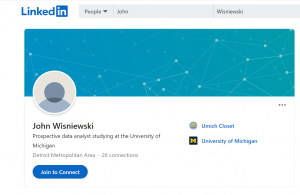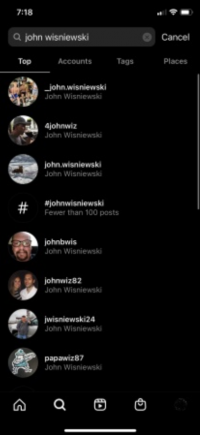John Wisniewski
You probably already know what you're getting into if you clicked on this page, but I figured I better introduce myself just in case. Soon you'll know enough about me that I'd consider you a friend. So hello, my name is John Wisniewski. I know you probably want to get right into my essay, so I won't say any more. Buckle up and get ready to read: If there's one thing I've learned (and that I hope to convey), it's that I live under the illusion of data privacy.
Contents
Public Information
Not a lot of my information is public, and I have worked very hard to achieve this. When you look me up ("John Wisniewski"), no results appear, and this is because there is a prominent politician that shares my name. He looks a bit like Joe Biden and seems to have served in the New Jersey legislature [1].
To find information about me, you have to look up my name in addition to other parameters. For instance, if you look up "John Wisniewski Umich," the first result is actually about me! This page is my LinkedIn page, which I will talk about soon. And if you look up my name and my home city, you can access my voting records and information, which contain my address.
Many public results illustrate my past involvement in sports. If you look up my name and my high school, you can access articles in the newspaper about my performances in swim meets [2][3][4]. You can also access my 5k splits [5] and my mile time [6]. You can't access my best 5k time, as my coach mistakenly thought my name was "Jon" the entire time I ran cross country.Even though I curate the information, I don't fully control how LinkedIn uses my data. When I created my account, I didn't look into the privacy settings. When researching this project, I have noticed many areas where LinkedIn was using my data in ways I didn't want. I noticed they were using my location and demographic information to present more relevant ads. Personally, I don't understand why anyone would have this turned on. As I often do on any platform, I have since revised these settings to limit the amount of data on me that is collected.
Is my Public Identity Accurate?
Despite the somewhat surprising amount of correct information online about me, I like to believe that the answer to this question is no. My first name and last name are exceedingly common (my mom says our last name is like the Polish version of "smith"). Accordingly, much of the data that appeared during my searches didn't pertain to me. Even when you use more detailed parameters, results come up that still aren't relevant. I saw this trend a lot: if you didn't know anything about me, you would have a tough time looking me up. I often wonder how other people interpret the information they find when they search for me. Do they realize the information is from someone else? Do they think the other Wisniewskis that come up are related to me? I will never know.
Beyond merely the lack of online information, Google does not accurately portray me. No one reading the 2014 edition of the school paper I linked earlier will be surprised by this. Much of the data is old and reflects who I was in the past. I was a very different person back then: I no longer swim or run competitively, and I'm definitely not 14. My beliefs and interests have changed. Despite this, and as much as I hate to admit it, my past is an integral part of my identity today. In this way, my online identity slightly alludes to my current identity.
Perhaps the most telling part of my online identity is my public LinkedIn profile. I wish that I could make this profile private. Every day I think about the trade-offs involved: keep my profile public and potentially receive a job or protect my information from other people online. Personally, I feel there is a lot of pressure from society to look for a job continually. Even though I have an internship lined up for the summer, I always wonder if a company could offer me something better.
The rest of my outdated information doesn't really bother me. What scares me about my online identity is that my address is so readily accessible, and a public institution that is the foundation of our country is the source. I'm not at high risk here: if someone finds my address, it wouldn't be the worst thing to happen. However, I'm concerned for people who need to protect this information (domestic abuse victims immediately come to mind). Despite legally being public, I feel this information can pose a (not insignificant) threat to our electoral system. If you knew that your address would be displayed online after you voted, and you feared your abuser would act on this information, would you vote? How many people do you think can't vote or express their democratic voice out of fear for their safety?
Private Information
Beyond my LinkedIn account, I don't appear much online. However, this isn't to say that I'm not online: I have public accounts on Tik Tok, Snapchat, and Twitter. I'm also active on Discord, Slack, YouTube, and GroupMe, but it is much harder to search for individual users on these platforms.
I have attempted to look up these profiles in their respective apps, and it was hard to find them. Most of my profiles are anonymous or not associated directly with me. My "professional" Instagram, and other social media profiles, didn't even show up when you search my name. This was interesting because I figured even if my account were private, people would still be able to see it: however, this is most likely not the case unless you know my exact username. I can only assume this is because I don't have many followers, and I imagine if you were somewhat associated with me, it might be more likely to show up.
This realization pleasantly surprised me. I always worry that my activity on private accounts will come back to haunt me. However, I feel that I would have a hard time abandoning my private accounts even if it did. I have joined online communities and made friends, and leaving these people behind would take a significant toll on my mental health. I'm sure we can all understand this stress, as maintaining online relationships has become paramount during the pandemic. I think ensuring anonymity and privacy plays a substantial role in creating online communities, as I can't imagine making friends on my LinkedIn.
Privacy Policy
Despite all this, I'm more than positive companies are still collecting my data. I have investigated Instagram's privacy policy and know they are collecting data on me. This contains (and is probably not limited to) how I use the platform and data based on my device and location [7]. Instagram appears to collect a lot more information for services I haven't heard of and won't ever use (which seems like a front to collect more data). It also appears Instagram uses my data to provide "insights for social good," which you can't turn off [8]. Even has a much better privacy policy. When they generate insights, they don't identify you which is a significant step towards data privacy.
Concluding Thoughts
While researching this project, I was continually surprised at how my life is presented online. There is an emphasis on sports and education. It is a purely qualitative view: results define my existence. Many aspects of where I present myself online don't appear on Google. Meanwhile, there is a lot of information that I haven't directly consented to display. I'm still not really comfortable with how my data is used if I'm perfectly honest. I also thought it was interesting how I have taken such efforts to protect my information, only to have my home address readily accessible in Google.
One of my primary goals in life is to feel comfortable in both in-person and online environments. Privacy and Data collection play a significant role in this. However, in attempting to have no digital footprint, I have let other people create my online identity. Despite having more privacy, I lose control of how I am presented. Maybe in the future, I will not have to choose between privacy and accuracy.
References
- ↑ Wikipedia:John Wisniewski
- ↑ http://www.hartlandschools.us/documents/Community%20Life/March%20CL%20Final.pdf
- ↑ http://www.hartlandschools.us/documents/Community%20Life/2015%20Feb.pdf
- ↑ http://www.hartlandschools.us/documents/Community%20Life/May%20CL%20Final.pdf
- ↑ https://www.newtontiming.com/results/15/hartland/5krun.html
- ↑ https://www.athletic.net/TrackAndField/SchoolRecords.aspx?SchoolID=35809&Grade=8
- ↑ https://help.instagram.com/519522125107875
- ↑ https://help.instagram.com/519522125107875


